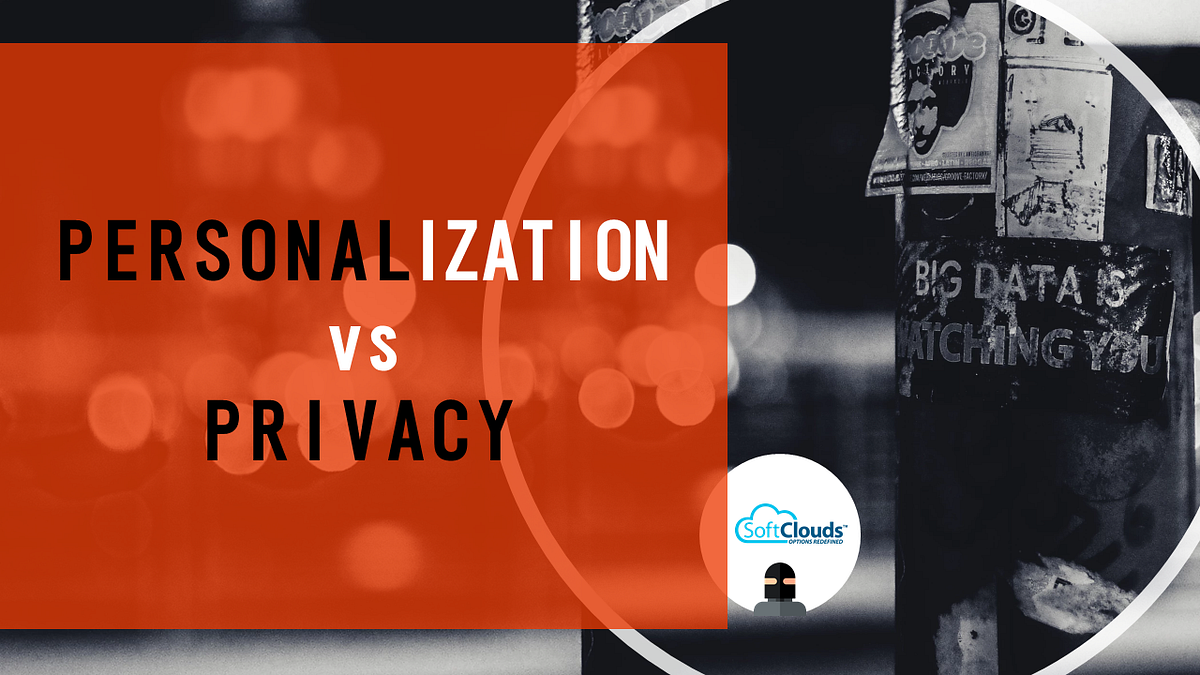Personalization & Customer Experience
The Paradox for Data Privacy!

2019Fast-forward to today, we are at the helm of personalization & hyper-individualization where customers are looking for instant gratification in user experience. Look at some of these remarkable stats to get a picture as to where Customer Experience (CX) is headed!
79% of consumers will engage with an offer only if it has been personalized to their taste.
80% of consumers consider their experience with a company to be more important than its products and services.
51% of consumers expect companies to anticipate their needs and provide relevant suggestions.
The Role of Personalization in CX
Consumers are placing a high value on being acknowledged as an individual. Their expectations of personalized experience are ever growing. Personalization or Hyper-Individualization is defined as one-to-one marketing in the truest sense. It is a combination of behavioral and real-time data of consumers.
Personalization drives results — it delivers five to eight times ROI on current marketing spends and has increased sales by 10%. For 78% of internet users, relevant content seems to increase their purchase intent.
Another benefit of hyper-individualization is to avoid ‘Information Overload’. For example — When a specific content is tailored to your interests, there is a manageable set of choices instead of pages of irrelevant results.
Here are some examples of how the top brands are exploring personalization.

Amazon — From the outset, Amazon has leveraged transactional data on each account to personalize marketing and enhance the ‘buy’ impulse. Based on search history, wish-list and shopping cart content, Amazon’s recommendation algorithm creates a personalized homepage for every consumer.

Netflix — This is another brand that has a brilliant recommendation engine. The streaming giant makes sure to personalize each user’s homepage based on their search, scroll, rating, time, date and view history.

Facebook — We see the videos Facebook makes on the social history of our friendship or on birthdays. These videos hold true only to you, makes it as personal and relevant as they can. We also have personalized news feed and ads based on our interests.
Data, Data, Everywhere! This is the only common thread among all the companies driving towards personalization.
The Role of Data in Personalization
By connecting the right data dots, organizations can create a digital journey for their consumers that matches their preferences and expectations. It can create seamless and cross-channel experiences that can deliver higher rates of conversion and loyalty.
However, with the flood of data collected, most marketers are yet to streamline their strategies based on data that requires a forensic understanding of which data matters most. Moreover, this abundant data can make algorithms more intricate; statistical optimizations are what these algorithms are based upon. Regardless of the amount of available data, there will always be instances where the output of the algorithm is not aligned with consumer expectations.
For example — There are many instances when ads have followed us even after the purchase has been made. This showcases that the ads are not personalized enough to capture the right purchase history.
Data Privacy
As consumer data gets larger and more personal, data protection and privacy are taking on greater importance. With more and more information being shared online like user behavior, personally identifiable information (PII), and many more, data privacy is taking on greater importance.
Furthermore, as technology is progressing, big data is being generated by most companies at a rapid pace. This data is vulnerable to data hacks and breaches. As criminal and state-sponsored organizations are now targeting this data, and data breaches have become more frequent. Here are some recent data breaches that brought data/privacy and security in the headlines. The impacts of these are profound, ranging from fraudulent identity, ransomware, or potential impact on elections.
Facebook & Cambridge Analyticahas been a classic example among the data breaches.
This data scandal was disclosed on Sep 2018, harvested on 87 Million Facebook profiles without their consent. This was also said to be used to influence public opinion for political campaigns. The social media giant had reported that the affected users were mostly compromised on their public profiles, timeline, news feed, and messages. Those using the Facebook app had their geo locations compromised. This scandal ignited several discussions on the ethical standards for data privacy.
ElasticSearch has been another victim of a huge data breach in Nov 2018, where personal information of 82 Million Americans was compromised. This data consisted of names, social security numbers, addresses, credit history, and other mortgage details.
Quora is the most recent sufferer of a data breach in Dec 2018. 100 Million users’ names, emails, IP addresses, passwords, public actions, blog posts and comments among many others were said to be compromised.
This data scandal was disclosed on Sep 2018, harvested on 87 Million Facebook profiles without their consent. This was also said to be used to influence public opinion for political campaigns. The social media giant had reported that the affected users were mostly compromised on their public profiles, timeline, news feed, and messages. Those using the Facebook app had their geo locations compromised. This scandal ignited several discussions on the ethical standards for data privacy.
Data Privacy
Europe — GPDR — This policy applies for data protection & privacy regulation for all individuals residing within the European Economic Area (EEA). It restricts the export of personal data outside Europe and gives control to individuals over their personal data.
United States — In the United States, many states have introduced data privacy laws. California has taken the lead by creating regulations that are like Europe’s GDPR. Per recently passed laws, companies that conglomerate user data could be targeted by class action lawsuits if they suffer breaches.
Despite such data protection laws, the consumer’s personal data keeps getting compromised on various fronts. One major reason being, companies are still under the misconception that personalization and data privacy cannot go hand in hand. Target’s predictive analysis was an ideal example of big data getting too personal. Target’s customer tracking technology with right analytics identified products that when brought together, could reveal the status of pregnancy. And that’s how it could declare its women customers if they are pregnant or not.
Hence, given the data privacy concerns, and the increased pressure on data protection, companies need to be smart in the data they collect and collect only what is needed. For the data they collect on their users, they need to exercise caution in keeping the data safe. Example — Marketers can build strong “inference” models about consumers using anonymized data like browsing behavior and purchasing history with personal information (like phone numbers and DOB) volunteered on social media. Pair this with legally or illegally obtained personally identifiable information (PII), and a marketer can pinpoint the user and strongly infer their behavior. And we also have programs like TACO coming up to help users safeguard their online data.
Smart Data vs Big Data
The only way to provide personalization and to keep the consumers’ data private is to maintain the right balance. It all settles down to Big Data versus Smart Data. Most companies of today are collecting all kinds of data on the consumer without understanding if they really need it. Since they collect all the data — they need to make sure that they store/secure their data. We propose the concept of Smart Data, where companies are to collect only the data that they need. This helps with reduced data, only the required data and can be stored and secured in a much better way than the big data.
Whether you collect smart data or big data — the best way to secure them is to encrypt them and distribute data across various tables and databases — so that even if a breach happens — it gets difficult for hackers to collate information correctly.
Final Thoughts
The advent of digital connectivity and the internet has impacted mankind in a myriad of positive ways but has a dark side too. When connected, we leave behind digital traces that makes us lose our privacy and security.
In the mobile 1st world of today, we are the digital natives who are raised on a stream of information and are constantly connected. We are the perpetual seekers of personalized experiences. However, with regular data breaches, I think, we are playing a losing game. Moreover, the current oversight of GDPR/US policies is not good enough.
Companies need to make a quick & real decision if they want to collect big data or smart data. We suggest that companies need to collect smart data (that is needed) on users and store them securely.
The next decade will start to see all the three pieces of the ecosystem (customer/companies/policies) evolve. Consumer Experience, Personalization, and Privacy will get to a mature state only when the friction between the customer, company & policies gets reduced with data privacy & security is the priority. Looking forward to seeing that happen.
. . .
. . .
This blog was written by Shankar Sitapati, Vice President, Technology at SoftClouds. He has a background in driving better digital customer experience through transformation projects. He has delivered global CX, CRM, and ERP solutions. His experience lies in Manufacturing Industry with a specialization in B2B e-Commerce. Shankar was honored with Oracle Retail CIO of the year in 2012.